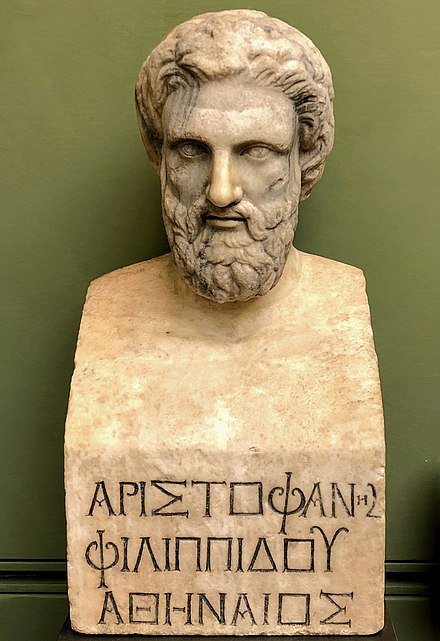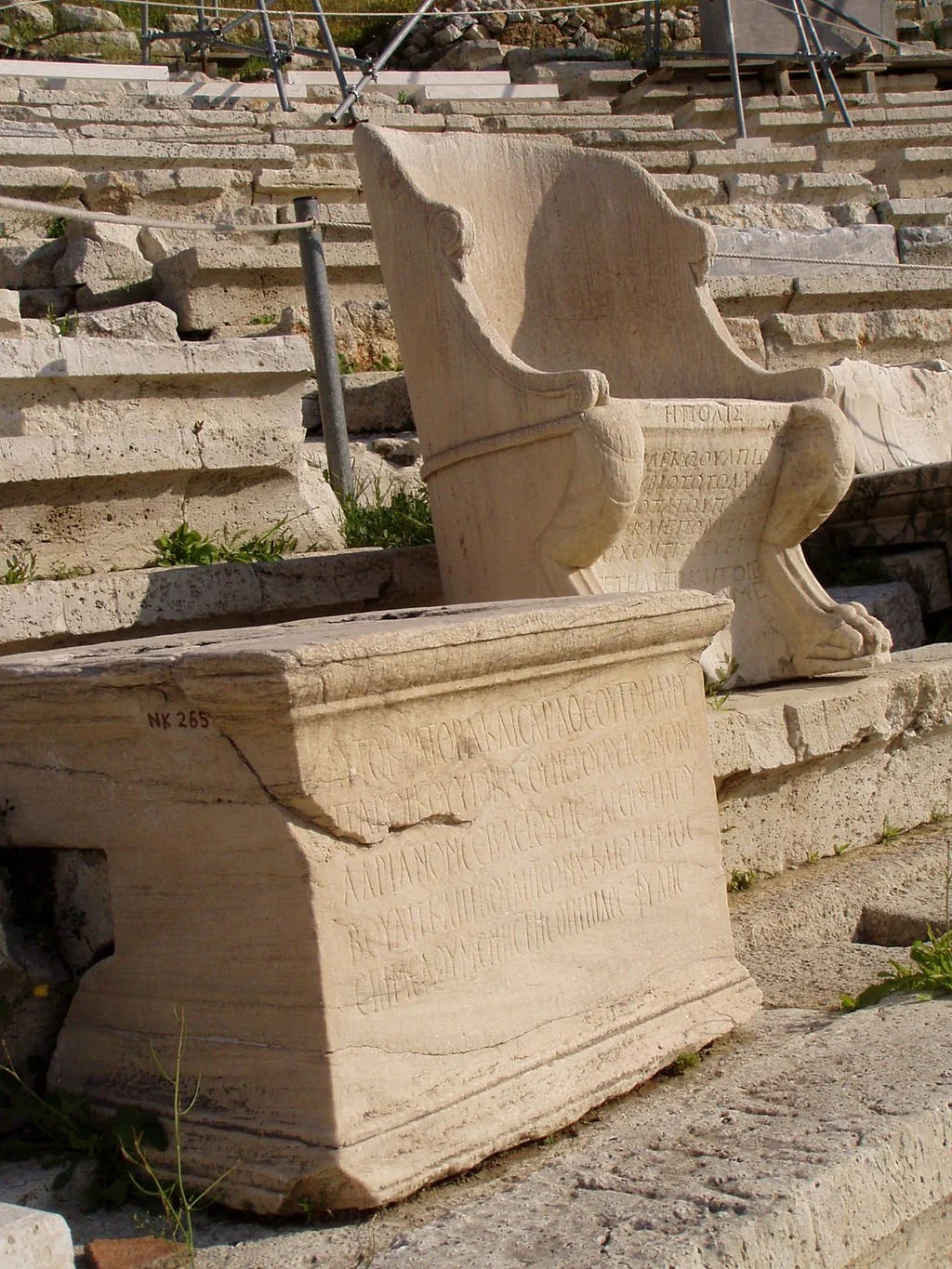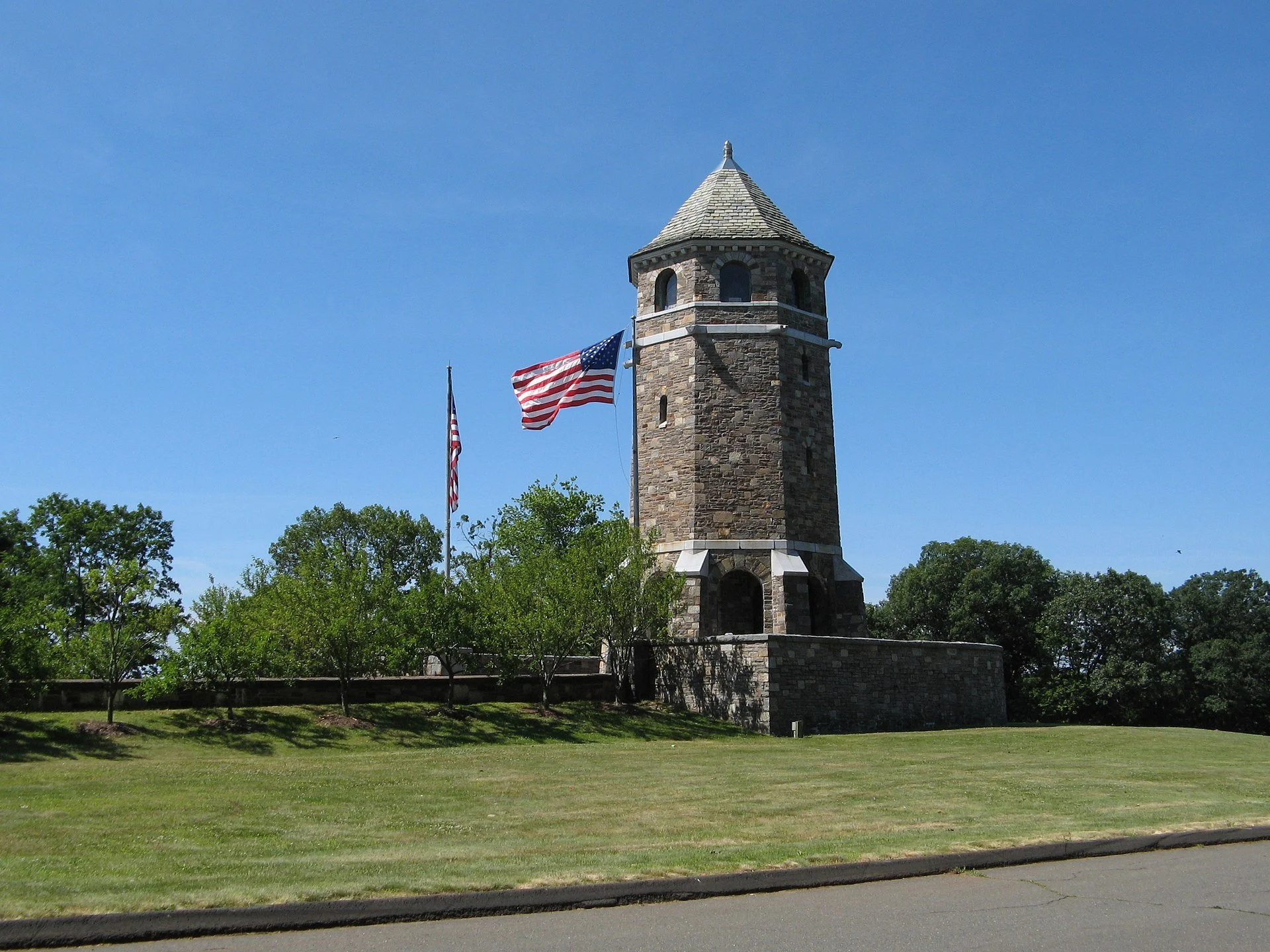
Don Pesci: Chatting with Aristophanes about comedy
Bust of Aristophanes (First Century A.D.)
The Theater of Dionysus, Athens . In the time of comic playwright and poet Aristophanes (446-386, B.C.) the audience probably sat on wooden benches with earth foundations.
VERNON, Conn.
Q: It’s so good to meet you (chuckles) in person, so to speak.
Aristophanes: Funny. Would you mind if I use that in the future?
Q: I wasn’t aware there was a future for the dead.
A: That is what I might call an example of the arrogance of the living. You are forgetting William Faulkner, who said, "The past is never dead. It's not even past." He wrote most persuasively about the past by resurrecting the dead in his novels. We all do that, in one way or another. You must remember that the only advantage those who are alive at present have over the dead is that they are alive and the dead are dead. That’s it.
Q: I wonder if you can confirm a story about you, not that it has anything to do with the subject of our discussion, the role of comedy in culture. It is said that you died from a falling roof tile that struck you on the head. One of our commentators said your manner of death was ironically appropriate, for a comic writer.
A: (nonplussed, a vacant look)
Q: He was making a joke.
A: Ah, yes, I get it. And you want to know if the joke is true?
Q: Yes.
A: Well, jokes are always true. But how can I tell you that the incident happened if I had been struck dead by a falling roof tile? Besides, if you have done even minimal research on me – a quick glance at what I call Wickedpedia – you will know that little is known of me? I managed to keep myself well hidden in the plays. Your age is obsessed with facts, but it is important to understand that facts, provided they are all accounted for, are vehicles that may lead to truth. But, in some instances, fiction serves the same purpose, which is why we do not dismiss Shakespeare and Faulkner as unimportant.
Q: It’s Wikipedia, by the way.
A: Not when you are punning.
Q: One of the purposes of this interview is to gather comments from the real Aristophanes about the real world.
A: From what I know of your time and world, I’m not sure (very condescendingly) you people understand either reality or your time in it. And being introduced to your world is a frightening prospect for anyone but a comic writer, provided he is allowed to ventilate his opinions. All comedy is what the moderns call transgressive, and all comedians are at bottom contrarians. Think of “the fool” in Shakespeare’s plays. A real take on your real world would reduce Euripides to tears and make Socrates blush -- and, believe me, Socrates was not given to blushing or Euripides to weeping.
Q: I should ask you, since you and other dramatists were the journalists of your day, do you think, as a general rule, that journalists also should be contrarians?
A: I do. So did Joseph Pulitzer and H.L. Mencken.
Q: I’m guessing the tyrant Creon was cool to your plays in which he was, some say, mercilessly caricatured.
A: In the Athenian republic of my day, it was understood that comics, the Shakespearian “fools” of Greece, should be permitted to dress down world saviors. After Sparta defeated Athens at the close of the Peloponnesian War, comic writers became considerably more cautious – for obvious reasons. As you may have guessed from a close reading of Lysistrata, I was in favor of what Henry Kissinger might have called an Athenian “diplomatic entente,” rather than a 26-year war with Sparta. Actually, Sparta’s peace terms were far less draconian than the terms imposed by World War I’s victors on a humiliated Germany. Sparta won the war, but Athens won the peace, nothing short of a miracle. Old Comedy became a more politically genteel New Comedy after the war, and the New Comedy was less wearing on the nerves of tyrants the world over. Your situation is similar. You have in your country the same fixation with world saviors – naturally, all of them Americans. In a regime of authoritarians -- or, worse, experts -- comedy is rarely tolerated, because comedy is an attempt to readjust proper proportions. When things are out of shape, the comic is the person who whacks them, by means of his comedy, back into shape. It is impossible to imagine in Russia, for instance, a roast of Putin. When I was approached on the street by one of Creon’s lackeys who demanded, “Don’t you take anything seriously?” I responded, as any good comic should, “Of course, I take comedy seriously.” After Athens’s defeat by Sparta at the decisive Battle of Aegospotami, such responses became less advisable and comic wit suffered grievous indignities. Fortunately, I lived to see the revival of Athens after its crushing defeat by the Spartan General Lysander in 405 B.C. Creon wanted a war to the finish with Sparta – and he got one.
Q: Naturally we care more about our present than your past, despite what has been said by Faulkner. But what riches can you bring to our reality?
A: The French, who can be amusing if you catch them in a nonpolitical mood, say – a poor translation – “the more things change, the more they remain the same.” You are now in the process of scourging your comedians. It will not be long before you hoist them on a cross. Here is some advice worth something: comedy is the canary in the cultural mineshaft. And a poisonous culture will repress comedy first, and everyone else later, simply bury them under mounds of humorless, pretentious group-think. Just before the Hungarian revolt, a worker slated by Karl Marx as the future owner of the means of production was asked to comment on his condition under the Marxist-Leninist dispensation. “They pretend to pay us,” he said, “and we pretend to work.” That man understood the proper use of comedy.
Don Pesci is a Vernon-based columnist.
The Tower on Fox Hill in Henry Park, Vernon
Robert Scott: Market Basket battle as a Ancient Greek epic play
NEWPORT, N.H.
A Market Basket movie!? Not as far-fetched as you would think. This is an epic Greek tale. If Aristophanes or Aeschylus were alive, they would be penning a play based on it called monopolion (monopoly). It has all the elements of a compelling story.
Arthur T. Demoulas, the protagonist, and the once and future CEO of the supermarket chain, embodies all the values and virtues of the hero or "The Great Man'' that Aristotle wrote about . He has integrity, humility, kindness and generosity.
He's also a brilliant strategist, a truly inspiring and effective strategos (general) who had not only the loyalty of the stratou (army -- his employees) but their unfading love. Such love for a leader is a rare thing in 2014 American society.
Yet ATD’s leadership model is not of our mainstream culture but a hybrid creation of Greek-American culture. ATD’s unwavering adherence to the high-minded standards of our grandparents and parents make this amazingly successful and wealthy man in 2014 America; a true “rock star”. All I can think is how proud they are of him as they look down from above…. Well done, Anthanasios Telemachus.
His cousin Arthur D. Demoulas, the antagonist, is a figure that seems cast out of some ancient Greek epic in the image of ploutokrat pelonexia -- one driven to seek power and wealth above all.
Such a figure is reviled in American society but these ancient playwrights made comic sport of them, Surrounding ASD is the ploutokratia, his elite Ivy League stratou, whose members believe that their education, wealth and privilege entitle them to dominate the polis (average citizen).
The stage for the epic is set as these two diametrically opposite forces clash to have mono polein (sole control) of this most valuable entity. ASD’s stratou fires the first shot and sacks ATD and his management team. The ATD stratou erupts and with their massive numerical advantage bring operations to a dead halt. Then they appeal to their customers to come and support them.
What is truly miraculous is that the customers supported their neighbors, and ATD’s stratou is now not 25,000 but 2 million strong. Xerxes, the Persian emperor, watched in horror as the underestimated Athenian fleet cleaned his clock!
The playwrights would go to town mocking the hubris of elite lawyers, Wall Street bankers and Global 100 Executives in their luxurious air-conditioned offices while calling for the blessings of the gods upon the virtuous employees and customers protesting/ standing tall in the heat of the midday sun. As each side parried and thrust for six long weeks, the fate of millions hung in the balance. Who will have mono polein? The ASD stratou of greed or the ATD stratou , which seeks to preserve the advantages of their beloved Market Basket.
The amount of the lutoros ( ransom) is agreed on and the painful details of the deal are forged against the backdrop of still more nasty dialogue and hatred in the family, as the playwrights examine the many foibles and hypocrisies of the elite.
Virtue prevails and the strategos ATD rises like a protathlitis (the champion leader) while the chorus on both side of the stage proclaim .. "nike, nike, nike'' (victory). There is no doubt in my mind that an epic struggle like this would have a play written about it to memorialize the lessons that it teaches us. It would be a way of instructing our children and grandchildren about this golden moment when the privilege of the few was destroyed by the unity of the many.
Is that what Gen. John Stark meant when he said, “Live or Die” as we rejected the privilege of monarchs and empowered the citizens of New Hampshire? No doubt in his youth he read Aristophanes and those desires for dignity and freedom found their source.
So, yes, I’m all in favor for a Market Basket movie. Who would play ATD?. Ah, Nicolas Cage.
Robert Scott is a psychologist, consultant, writer, Republican Party activist and former New Hampshire state representative. He lives in Newport, N.H.


